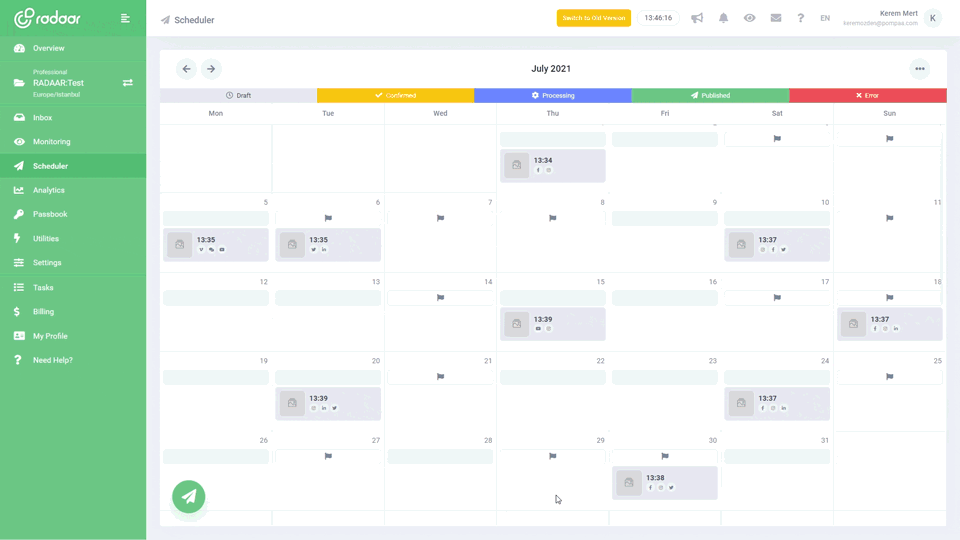How can you measure social media success effectively?
Unlock the secrets to quantifying your social media success with our comprehensive guide, featuring practical tips and key metrics to track. Read on to transform your social media strategy and drive meaningful results!
LEARN MORE LAUNCH DEMO NOW In the ever-evolving world of social media, understanding how to measure success effectively can make a significant difference for businesses and influencers alike. Gone are the days when merely having a large number of followers and likes was considered an accurate measure of online influence. Today, it's about quality, engagement, and real impact. But with so many metrics available, how do you discern which ones truly matter and how do you use them to gauge your social media success?
To navigate this complex landscape, you need a strategic approach that focuses on comprehensive metrics tailored to your specific goals. Whether you're aiming to increase brand awareness, drive website traffic, or foster community engagement, selecting the right KPIs (Key Performance Indicators) is crucial. This blog post will guide you through various metrics, from engagement rates and reach to conversions and sentiment analysis, equipping you with the tools to measure your social media success more effectively. Let's dive in and uncover the secrets to making your social media efforts truly count.
To navigate this complex landscape, you need a strategic approach that focuses on comprehensive metrics tailored to your specific goals. Whether you're aiming to increase brand awareness, drive website traffic, or foster community engagement, selecting the right KPIs (Key Performance Indicators) is crucial. This blog post will guide you through various metrics, from engagement rates and reach to conversions and sentiment analysis, equipping you with the tools to measure your social media success more effectively. Let's dive in and uncover the secrets to making your social media efforts truly count.
Table of Contents
- What key metrics should you focus on?
- How to track engagement on social media?
- What tools make analysis more efficient?
- How to interpret data to gain insights?
- How often should you analyze your data?
- What role do demographics play in analysis?
- How to set realistic social media goals?
- Why is competitor analysis important here?
- Start leveraging social media analytics today!
What key metrics should you focus on?
When it comes to measuring social media success, it's essential to focus on key metrics that align with your goals. Engagement metrics like likes, comments, shares, and retweets indicate how well your content resonates with your audience. Reach and impressions help you understand the size and scope of your audience. Additionally, conversion metrics such as click-through rates, sign-ups, and sales show the direct impact of your social media efforts on your business growth.
How to track engagement on social media?
To track engagement on social media effectively, begin by monitoring key metrics such as likes, comments, shares, and retweets, which provide immediate insight into how your audience interacts with your content. Utilize built-in analytics tools on platforms like Facebook Insights, Twitter Analytics, and Instagram Insights to gather data. Pay attention to metrics like engagement rate, which measures the percentage of your audience that interacts with your posts. Finally, consider using specialized social media management tools like Hootsuite or Sprout Social for more comprehensive analysis and reporting.
What tools make analysis more efficient?
When it comes to measuring social media success effectively, having the right tools can make all the difference. Tools like Google Analytics can provide insights into how social media traffic translates into website visits and conversions. BuzzSumo is great for content analysis, helping you identify the most shared content and influencers in your niche. Hootsuite and Sprout Social offer comprehensive social media management features, including performance analytics that track engagement, reach, and growth across multiple platforms.
Using specialized tools also saves time, enabling you to focus on optimizing your strategies rather than collecting data manually. Tools like Mention and Brand24 allow you to monitor mentions of your brand across social media and the web, giving you real-time feedback. Socialbakers and Rival IQ are excellent for competitive analysis, providing insights into how your social media performance stacks up against competitors. By leveraging these tools, you can gain a deeper understanding of your audience, tailor your content more effectively, and ultimately achieve your social media goals.
Using specialized tools also saves time, enabling you to focus on optimizing your strategies rather than collecting data manually. Tools like Mention and Brand24 allow you to monitor mentions of your brand across social media and the web, giving you real-time feedback. Socialbakers and Rival IQ are excellent for competitive analysis, providing insights into how your social media performance stacks up against competitors. By leveraging these tools, you can gain a deeper understanding of your audience, tailor your content more effectively, and ultimately achieve your social media goals.
How to interpret data to gain insights?
Interpreting data to gain insights from your social media success involves looking beyond the surface numbers. Start by identifying key metrics, such as engagement rates, follower growth, and conversion rates, to understand how your audience interacts with your content. Compare these metrics against your goals to pinpoint what’s working and what needs tweaking. Finally, use trends and patterns to refine your strategy, ensuring you’re continually optimizing your approach to connect effectively with your audience.
How often should you analyze your data?
Analyzing your social media data should be a regular habit to ensure you're on track with your goals, but it doesn't have to be overwhelming. Aim to conduct a comprehensive analysis at least once a month to detect trends and make informed adjustments to your strategy. Weekly check-ins can help you catch any immediate issues or opportunities, while daily reviews of key metrics can keep you agile and responsive. By maintaining this balanced approach, you'll stay informed without feeling bogged down.
What role do demographics play in analysis?
Demographics play a pivotal role in analyzing social media success by offering insights into the age, gender, location, and interests of your audience. Understanding these details helps tailor content that resonates more effectively with your target groups, thereby boosting engagement and reach. Additionally, demographic analysis aids in identifying which segments are most profitable or responsive, allowing for more precise and impactful marketing strategies. Ultimately, this leads to a more personalized and successful social media presence that aligns with your brand goals.
How to set realistic social media goals?
Setting realistic social media goals starts with understanding your business objectives and how social platforms can help achieve them. Begin by analyzing past performance, industry benchmarks, and audience insights to set attainable targets. Use the SMART criteria—Specific, Measurable, Achievable, Relevant, and Time-bound—to define your goals clearly. This approach ensures your efforts are focused, trackable, and aligned with overall business success.
Why is competitor analysis important here?
Competitor analysis is crucial for measuring social media success because it provides a clear benchmark of what "success" looks like in your industry. By evaluating your competitors’ social media strategies, you can identify the tactics that are working well and adapt them to fit your own brand. This doesn’t mean copying their every move but rather understanding the type of content that resonates with your shared audience. This can help you innovate and find unique ways to present your message more effectively.
Moreover, competitor analysis offers insights into your competitors' weaknesses, which you can exploit to your advantage. If a particular type of post or campaign didn’t do well for them, it might be wise to approach that strategy differently or avoid it altogether. Additionally, you can gauge your progress relative to your competitors by comparing key metrics such as engagement rates, follower growth, and audience demographics. This ongoing comparison ensures that you stay competitive and continually refine your social media efforts to better serve your audience.
Moreover, competitor analysis offers insights into your competitors' weaknesses, which you can exploit to your advantage. If a particular type of post or campaign didn’t do well for them, it might be wise to approach that strategy differently or avoid it altogether. Additionally, you can gauge your progress relative to your competitors by comparing key metrics such as engagement rates, follower growth, and audience demographics. This ongoing comparison ensures that you stay competitive and continually refine your social media efforts to better serve your audience.
Start leveraging social media analytics today!
In conclusion, start leveraging social media analytics today to transform your online presence from guesswork to a data-driven, strategic powerhouse. By diving into these analytics, you can uncover invaluable insights about your audience's preferences, behavior, and engagement patterns. This enables you to fine-tune your content, optimize your posting schedule, and ultimately enhance your overall social media strategy. Remember, understanding the metrics behind your social media activities is the first step towards achieving tangible marketing success.
Don't wait to harness the power of social media analytics for your business. The tools and resources are at your fingertips, ready to provide clarity and direction. As you better understand what works and what doesn’t, you can make informed decisions that will drive better results, improve your brand's online visibility, and foster a stronger connection with your audience. So, take that leap today and start turning social media data into meaningful growth and long-lasting success.
Don't wait to harness the power of social media analytics for your business. The tools and resources are at your fingertips, ready to provide clarity and direction. As you better understand what works and what doesn’t, you can make informed decisions that will drive better results, improve your brand's online visibility, and foster a stronger connection with your audience. So, take that leap today and start turning social media data into meaningful growth and long-lasting success.
SOCIAL MEDIA SCHEDULER
Plan and publish...
Plan and publish your content for Facebook, Instagram, Twitter, and LinkedIn from one simple dashboard.
LEARN MORE FREQUENTLY ASKED QUESTIONS
What is social media management platform?
RELATED BLOG POSTS
All the tips & tricks you'll need...
Get the fresh tips and tricks you'll need to ace social media marketing.












